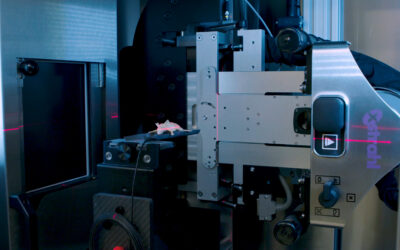As the population ages, more elderly patients require radiotherapy-based treatment for their pelvic malignancies, including muscle-invasive bladder cancer, as they are unfit for major surgery. Therefore, there is an urgent need to find radiosensitising agents minimally toxic to normal tissues, including bowel and bladder, for such patients. We developed methods to determine normal tissue toxicity severity in intestine and bladder in vivo, using novel radiotherapy techniques on a small animal radiation research platform (SARRP). The effects of panobinostat (PAN) on in vivo tumour growth delay were evaluated using subcutaneous xenografts in athymic nude mice. PAN concentration levels in xenografts, plasma and normal tissues were measured in CD1-nude mice. CD1-nude mice were treated with drug/irradiation combinations to assess acute normal tissue effects in small intestine using the intestinal crypt assay, and later effects in small and large intestine at 11 weeks by stool assessment and at 12 weeks by histological examination. In vitro effects of PAN were assessed by qPCR and of PAN, TMP195 and mocetinostat by clonogenic assay, and western blot. PAN resulted in growth delay in RT112 bladder cancer xenografts but did not significantly increase acute (3.75 days) or 12 weeks’ normal tissue radiation toxicity. Radiosensitisation by PAN was effective in hypoxic bladder cancer cells and associated with class I HDAC inhibition, and protein downregulation of HDAC2 and MRE11. Pan-HDAC inhibition is a promising strategy for radiosensitisation, but more selective agents may be more useful radiosensitisers clinically, resulting in fewer systemic side effects.
Blaz Groselj, Jia-Ling Ruan, Helen Scott, Jessica Gorrill, Judith Nicholson, Jacqueline Kelly, Selvakumar Anbalagan, James Thompson, Michael RL Stratford, Sarah J. Jevons, Ester M. Hammond, Cheryl L. Scudamore, Martin Kerr and Anne E. Kiltie







